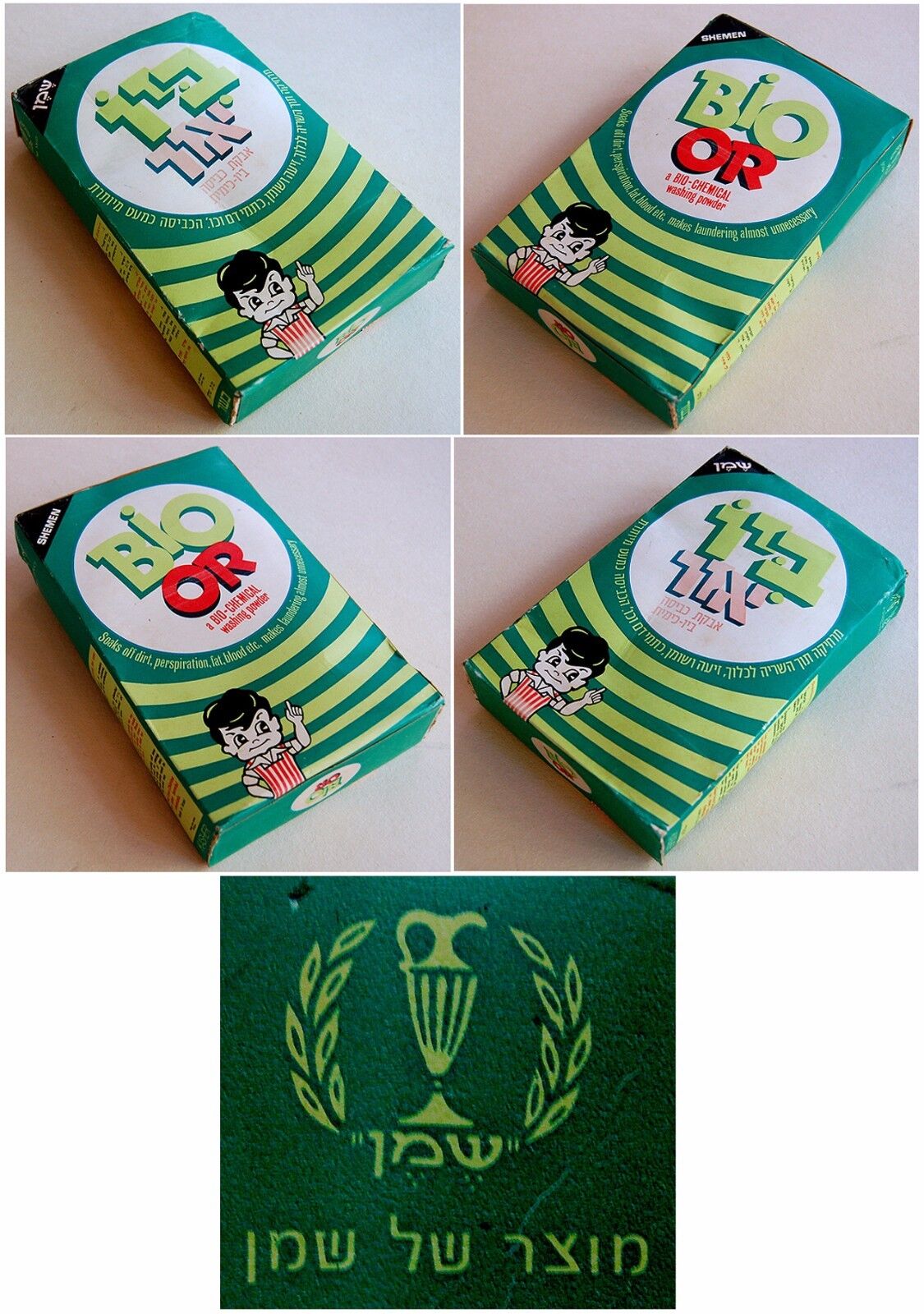1960 Israel ADVERTISING BOX Haifa \"SHEMEN\" Graphic PACKAGE Logo HEBREW Judaica

When you click on links to various merchants on this site and make a purchase, this can result in this site earning a commission. Affiliate programs and affiliations include, but are not limited to, the eBay Partner Network.
1960 Israel ADVERTISING BOX Haifa \"SHEMEN\" Graphic PACKAGE Logo HEBREW Judaica:
$65.00
DESCRIPTION : Offered here is a RAREintact , unused, unopened , OriginalILLUSTRATED advertising CARDBOARD- PACKAGE of an original vintage WASHING POWDERwhich was manufactured in ISRAEL in ca 1960\'s - 1970\'s by the \"SHEMEN\" factory in HAIFA , Main manufactor of OIL , DETERGENTS, SOAPS, and OLIVE OIL products. A rare Soap - Detergents - Box design - Graphic design - Judaica - Jewish - Israel Industry related collectible. Hebrew & English texts. 1.5 x 1.5 x 3.5\" . Very good condition.The powder itself is unused , intact , still inside its sealed naylon wrapping. The corners of the illustrated advertising cardboard box are slightly bumped. ( Please watch the scan for a reliable AS IS scan ) Item will be sent in a special protective rigid sealed packaging.AUTHENTICITY :Theitem isfullyguaranteed ORIGINAL from Ca 1960\'s - 1970\'s,It holds a life long GUARANTEE foritsAUTHENTICITY and ORIGINALITY.PAYMENTS : Payment method accepted : Paypal .SHIPPMENT : Shipp worldwide via registered airmail is $ 17.Item will be sent in a special protective rigid sealed packaging. Will be sent within3-5 days after payment . Kindly note that duration of Int\'l registered airmail is around 14 days.Shemen Industries Ltd The Idea The idea of innovating and founding an industry in Israel was first raised in the beginning of the previous century by a group of Hovevei Zion from Minsk, Russia. In 1903, Nahum Wilboshvitz (later known as Wilbosh), who headed the group, came to Israel in order to check the possibilities of industrial development in the country: searching for energy sources, examining ways of improving and developing the traditional industries, mainly of oil and soap. Wilbosh proposed to establish a company, which will engage in secondary production of olive oil made of rape once the oil is extracted. At the time, the process was performed using wood-pressers. Wilbosh suggested using chemical resources such as gasoline. The Foundation On a crowded land with olive plantations and oil-pressers that sell rape, a place was found. 100 dunam were bought from the land of Haditha village (located north-east of Lod). Wilbosh traveled to Europe in the purpose of learning the process of chemical extraction and ordering the required equipment. \"Hadid\" factory, later known as \"Ben-Shemen\", was established in 1905 with the financial assistance of Jews from Tzritzin who accepted Wilbosh\'s enterprise. The factory began working by the end of January 1906, when all the equipment arrived. The first season was not particularly blessed – out of 260 tons of rape, only 10% of oil was produced, and by the end of the season, the amount of oil reduced to merely 5-6%. The factory was used by Petach-Tikva and Rehovot\'s farmers. \"Atid\" Factory In 1906 Wilbosh married Shoshana Fineberg. Along with Shmuel and Eliyahu Berlin, he founded \"Atid\" company: a factory for oil and soapwort (i.e. extracting rape oil and soap). \"Achad ha\'Am\" named the factory and \"Hadid\" factory joined the company. After purchasing a property on the seashore in Haifa, the factory was built from hewn stone (later it became a museum of oil industry). Nahum Arman managed the soapery, and the number of \"Atid\" workers amounted to 100 families within two years. Once the iron-pressers started working in the traditional industry, the percentage of rape oil decreased meaningfully, and thus, rape oil gradually became less profitable. Due to economic difficulties, the factory was shut down in 1910 and the factories were leased. Nahum Arman continued with a limited soap manufacturing until 1922. Establishing \"Shemen\" Despite the difficulties, Nahum Wilbosh did not give up, and in 1919 he founded \"Shemen\" company in London together with his brothers Moshe and Gedaliah Wilboshvitz and Eliyahu Panison. Since they needed a duty free port in order to export, they planned on building one near Caesarea. Houses were leased and schemes were written, but the British government objected, in spite of Zeev Jabotinsky\'s lobbyism. In 1922 Nahum and Gedaliah Wilboshvitz began establishing \"Shemen\" factory near \"Atid\" factory and started assembling the machines. In the new factory, advanced methods of manufacturing and machinery were integrated – hydraulic pressers and diesel engines as well as a modern refinery and soapery. The factory\'s engines were inaugurated in December 1924 by the British High Commissioner, Sir Herbert Samuel. \"Shemen\" factory put much effort in prompting and marketing the consumption of Israeli products, and was among the first factories which took a major part in building the country. The Modern Oil Industry At later times it was found that extracting oil from olives rape damages the oil quality, and therefore, this method of oil production was stopped at the late 70\'s. The oil industry moved to producing oils from grains of different plants such as: soybean, safflower, sunflower and corn whereas the olive oil industry returned only to a mechanical method of manufacturing by olive crushing, extracting the mash and separating the oil juice from the oil. Today \"Atid\" factory is located on the grounds of the \"Shemen\" factory in Haifa, and it has a museum which displays the oil industry in Israel, since ancient times to the beginning of manufacture until nowadays
1960 Israel ADVERTISING BOX Haifa \"SHEMEN\" Graphic PACKAGE Logo HEBREW Judaica:
$65.00
